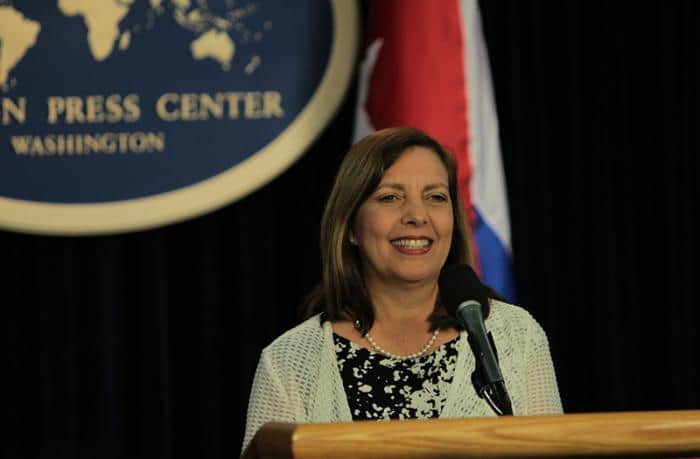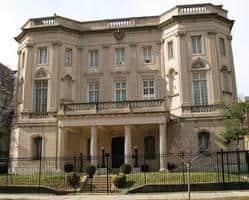“Maybe I’m idealistic, but I’m a true believer in the strengths Cuba has as a nation. One of the most precious things we have is our people. And this will help in our new relations with the United States…”
During the four years Josefina de Caridad Vidal Ferreiro spent as first secretary of the Cuban Interest Section in Washington, D.C., it was among the worst of times in the ongoing, never-ending bad times between the United States and Cuba.
Her tenure began in 1999 with a bitter tug of war between the exile community in Miami and the Cuban government over the fate of Elian González, the Cuban boy who had washed up on American shores after his mother drowned trying to cross the Florida Straits.[1]
Vidal was also in Washington during the trial, conviction and sentencing of the Cuban Five — and for the very beginnings of what would turn out to be the 16-year campaign to win their freedom.
But it was the election of George W. Bush as president of the United States that made her job most difficult. “I used to tell Americans, ‘Bush destroyed everything,’” Vidal says flatly. “He eliminated all the small openings for exchanges, family visits, conversations, everything.”
Though she spent her work days visiting the US Congress, meeting with the State Department — sometimes as often as three times a day — and dealing with various think tanks, NGOs and universities, she says everything about relations between officials of the two countries was “official. There were no personal friendships any longer. It was tough.”
She remembers asking Wayne Smith, the former American diplomat who headed up the US Interest Section in Havana during the Carter administration about his access to Cuban officials during his tenure. “He told me, ‘Josefina, Fidel Castro used to call me all the time. I used to go see him at his office … Fidel would call me to go fishing and scuba diving.’…[2] That seemed so far away to me,” Vidal recalls today, “because we didn’t do any of that any more.”
While the chances of Barack Obama inviting the about-to-be Cuban ambassador to the US to to shoot hoops with him at the White House are remote, Monday’s re-opening of the Cuban embassy in Washington and the U.S. embassy in Havana does represent a seismic diplomatic shift from the state of play during Vidal’s days in the US capital.
It’s a transformation for which Josefina Vidal can claim much of the credit.
Soon after presidents Barack Obama and Raul Castro spoke simultaneously to their citizens on December 17, 2014, announcing they were ready to begin a process of re-establishing respectful relations between their countries, the Cuban government named Vidal — the director general for the United States in the country’s ministry of foreign relations — as its chief negotiator.
It’s a role she seemed almost destined to fulfill.
In 1979, she was one of a number of bright young Cuban students selected to study international relations in Moscow. “Cuba told us to learn English and either specialize in a Commonwealth country or the United States. Knowing how important the United States was for Cuba, I chose to specialize in America.” She spent five years studying American history, culture, economics “and everything else.” She wrote her thesis on President Jimmy Carter’s 1970s decision to try to normalize relations with Cuba.
After graduation, she returned to Havana where she spent six years at the University of Havana’s Center for the Study of the United States, “specializing more.”
“I am quite certain she knows more about the United States than most of the US officials that she deals with know about Cuba,” John Coatsworth, an international relations scholar at Columbia University in New York who got to know Vidal during her time in Washington, summed it up for a reporter.
Vidal, who is married to another Cuban diplomat, José Anselmo Lopez Perera, joined the foreign service in 1997. After a brief stint in Paris, the couple was posted to Washington in 1999. In 2003, Lopez Perera became one of 14 Cuban diplomats declared “persona non grata” and expelled for espionage as part of an ongoing war of words between the Bush administration and Havana.
Although she’s been based in Cuba since then, Vidal has become her country’s public face to Americans — from greeting visiting Congressional delegations, to appearing on CNN with Wolf Blitzer in 2012 to defend Cuba’s handling of the case of then-imprisoned USAID subcontractor Alan Gross, to explaining the Cuban view of the current ongoing negotiations.
In the process, she has gained respect for her intelligence, commitment, personal warmth — and her honesty. “She doesn’t miss a trick,” one US official was quoted as saying, “but she doesn’t pull any either.”
“With Josefina, what you see is what you get: substance,” American Cuba expert Julia Sweig told the Los Angeles Times. “She has a great deal of authority — and the full force of her president behind her.”
She’s won plaudits from those she’s negotiated with — and criticism from Cuban exile hardliners — for her diplomatic, closed-doors massaging of the complex, ingrained, intractable differences that had built up like scar tissue between Washington and Havana over the course of 55 years of hostility.
Her most important diplomatic success during the talks, of course, was getting the US to remove Cuba from its list of countries designated as “state sponsors of terrorism” — and achieving that without Cuba having had to “give up” anything in return. The reality, Vidal herself says, is that the Cubans had no need to engage in traditional this-for-that horse-trading with the US. “There are many more things to dismantle on the US side than on the Cuban side.”
Although the re-opening of embassies marks a major milestone in the historic restoration of relations between the US and Cuba, Vidal’s work is far from complete. Cuba’s continuing to-get-done list includes: getting the Americans to lift the blockade against Cuba (Vidal has made the point many times that, while only Congress can end the blockade, the president can do much more than he has done so far to limit its impact); negotiating the return of the Guantanamo naval base land to Cuba; ending illegal broadcasts by Radio and TV Marti, abandoning the Cuban Adjustment Act’s unequal treatment of Cuban exiles; and, of course, writing “the end” to US-sponsored regime change programs in Cuba.
“Real life tells us that they are still requesting multi-million dollar funding to sustain these types of programs,” Vidal explains. Even after December’s announcement, Congress agreed to continue to fund regime change programs to the tune of $20 million this year, the same as last. Cuba considers such programs illegal “since they are programs directed toward provoking change within our country… without any sort of consent from authorities or the Cuban government.”
While Vidal believes there has been no change in the ultimate American objective, she is quick to add, “a new stage has begun.” The Americans have moved away from “open confrontation” to “a stage in which we have decided that we are going to re-establish relations to seek solutions to the differences between us.” It may be a less-than-complete change but Vidal believes it’s still an important one. “We are talking, and we have learned to talk about the differences with respect, which was something lacking for over 50 years.”
For Cuba’s part, “we are not worried about Americans coming in and setting up McDonalds. We know that the US tries to impose its will, not only on Cuba but everywhere. But the US is not a strange country for Cubans; we have many years of cultural and family connections. Our relationship has always been a challenge, but we are up to the challenge. Maybe I’m idealistic, but I’m a true believer in the strengths Cuba has as a nation. One of the most precious things we have is our people. And this will help in our new relations with the United States.”
She pauses, smiles. “I hope in future, maybe when I’m not even on earth, we will be a model for how two countries can co-exist.”
[1] Vidal flew to Miami in 2000 to accompany the young González back to Havana. Although she wasn’t allowed to leave the plane while others helicoptered to a nearby Catholic University to meet him, she remembers the eventual flight back to Havana as “very moving, very touching.”
[2] “I don’t remember that particular conversation with Josefina,” Wayne Smith says today, “but I did have a friendly relationship with Fidel, though I don’t remember him ever inviting me to go skin-diving!”





 STEPHEN KIMBER, a Professor of Journalism at the University of King's College in Halifax and co-founder of its MFA in Creative Nonfiction Program, is an award-winning writer, editor and broadcaster. He is the author of two novels and eight non-fiction books. Buy his books
STEPHEN KIMBER, a Professor of Journalism at the University of King's College in Halifax and co-founder of its MFA in Creative Nonfiction Program, is an award-winning writer, editor and broadcaster. He is the author of two novels and eight non-fiction books. Buy his books